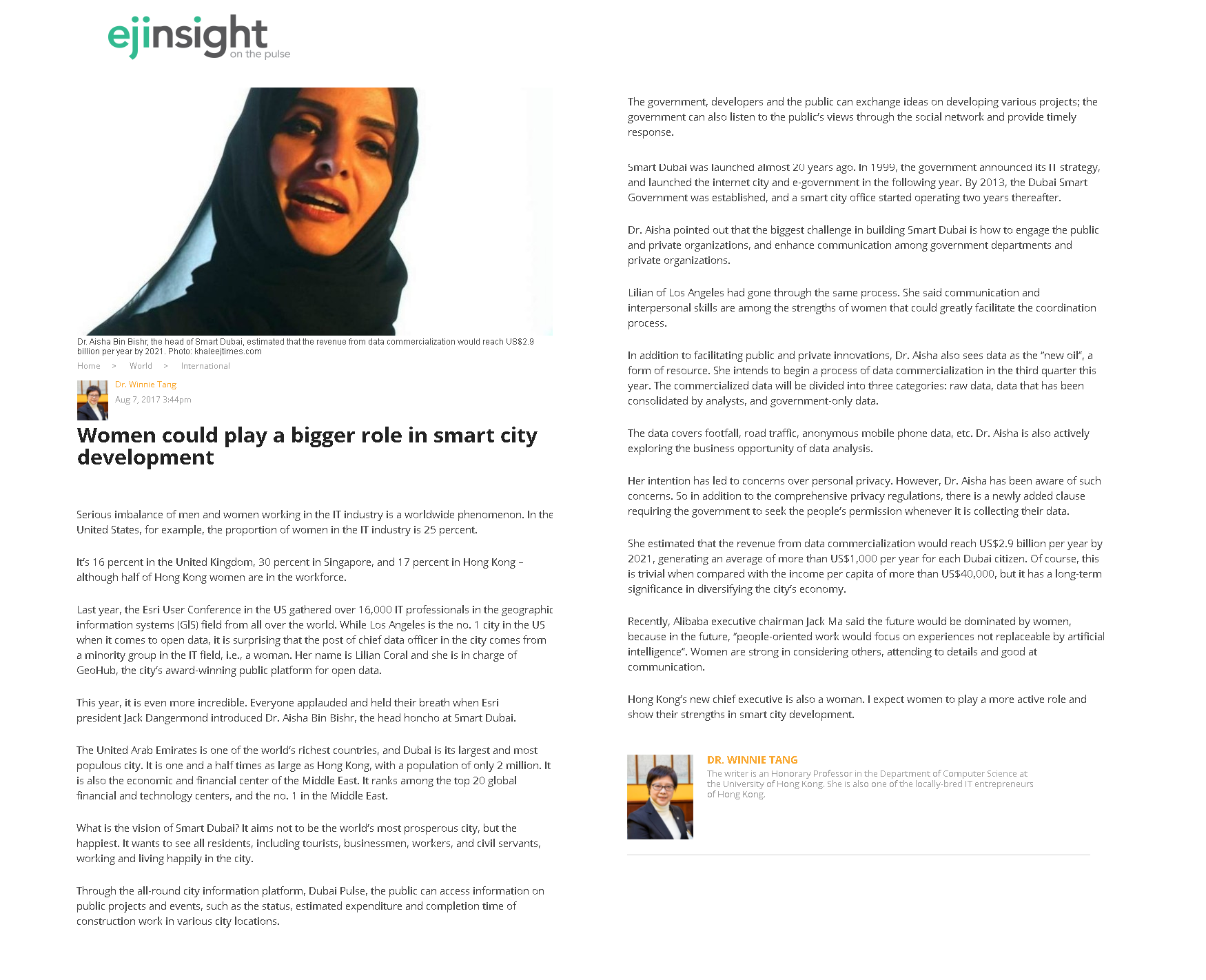網上版請按此

Women could play a bigger role in smart city development
Serious imbalance of men and women working in the IT industry is a worldwide phenomenon. In the United States, for example, the proportion of women in the IT industry is 25 percent.
It's 16 percent in the United Kingdom, 30 percent in Singapore, and 17 percent in Hong Kong – although half of Hong Kong women are in the workforce.
Last year, the Esri User Conference in the US gathered over 16,000 IT professionals in the geographic information systems (GlS) field from all over the world. While Los Angeles is the no. 1 city in the US when it comes to open data, it is surprising that the post of chief data officer in the city comes from a minority group in the IT field, i.e., a woman. Her name is Lilian Coral and she is in charge of GeoHub, the city's award-winning public platform for open data.
This year, it is even more incredible. Everyone applauded and held their breath when Esri president Jack Dangermond introduced Dr. Aisha Bin Bishr, the head honcho at Smart Dubai.
The United Arab Emirates is one of the world's richest countries, and Dubai is its largest and most populous city. It is one and a half times as large as Hong Kong, with a population of only 2 million. It is also the economic and financial center of the Middle East. It ranks among the top 20 global financial and technology centers, and the no. 1 in the Middle East.
What is the vision of Smart Dubai? It aims not to be the world's most prosperous city, but the happiest. It wants to see all residents, including tourists, businessmen, workers, and civil servants, working and living happily in the city.
Through the all-round city information platform, Dubai Pulse, the public can access information on public projects and events, such as the status, estimated expenditure and completion time of construction work in various city locations.
The government, developers and the public can exchange ideas on developing various projects; the government can also listen to the public's views through the social network and provide timely response.
Smart Dubai was launched almost 20 years ago. In 1999, the government announced its IT strategy, and launched the internet city and e-government in the following year. By 2013, the Dubai Smart Government was established, and a smart city office started operating two years thereafter.
Dr. Aisha pointed out that the biggest challenge in building Smart Dubai is how to engage the public and private organizations, and enhance communication among government departments and private organizations.
Lilian of Los Angeles had gone through the same process. She said communication and interpersonal skills are among the strengths of women that could greatly facilitate the coordination process.
In addition to facilitating public and private innovations, Dr. Aisha also sees data as the “new oil”, a form of resource. She intends to begin a process of data commercialization in the third quarter this year. The commercialized data will be divided into three categories: raw data, data that has been consolidated by analysts, and government-only data.
The data covers footfall, road traffic, anonymous mobile phone data, etc. Dr. Aisha is also actively exploring the business opportunity of data analysis.
Her intention has led to concerns over personal privacy. However, Dr. Aisha has been aware of such concerns. So in addition to the comprehensive privacy regulations, there is a newly added clause requiring the government to seek the people's permission whenever it is collecting their data.
She estimated that the revenue from data commercialization would reach US$2.9 billion per year by 2021, generating an average of more than US$1,000 per year for each Dubai citizen. Of course, this is trivial when compared with the income per capita of more than US$40,000, but it has a long-term significance in diversifying the city's economy.
Recently, Alibaba executive chairman Jack Ma said the future would be dominated by women, because in the future, “people-oriented work would focus on experiences not replaceable by artificial intelligence”. Women are strong in considering others, attending to details and good at communication.
Hong Kong's new chief executive is also a woman. I expect women to play a more active role and show their strengths in smart city development.
Dr. Winnie Tang
Honorary Professor, Department of Computer Science, The University of Hong Kong